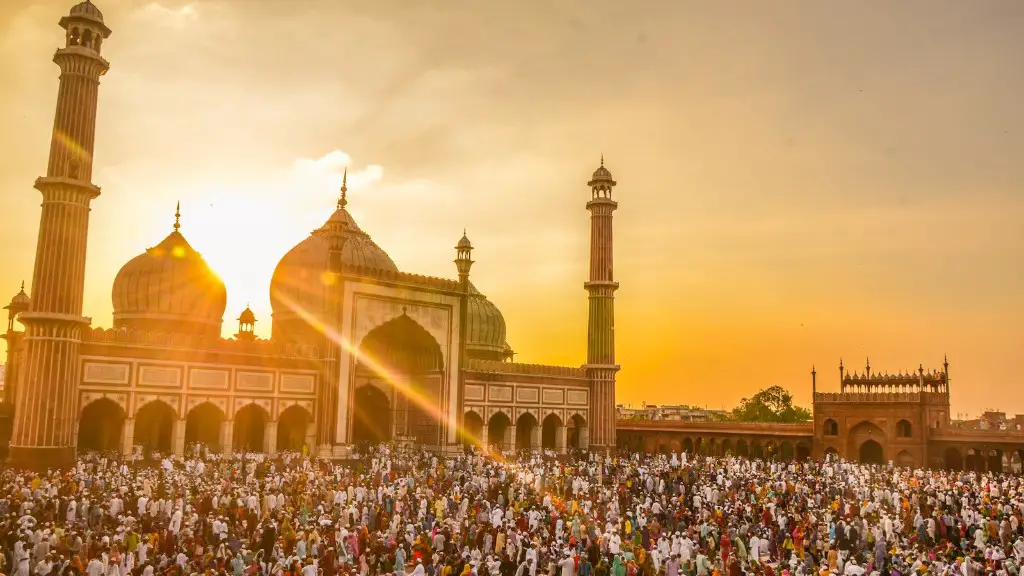Everyone celebrates holidays in some form or another, but what makes Judaism truly unique is the amount of importance placed on them. These holidays mark a unique passing of time in the Jewish calendar and help to bring the Jewish people closer together. So what are the most important holidays in Judaism?
The first of all the Jewish festivals is Rosh Hashanah, which is celebrated in the month of Tishrei (usually in September or October). This is the Jewish New Year, which signifies a new cycle of life and ushers in a period of prayer and self-reflection. During the 10 days from Rosh Hashanah until Yom Kippur, Jews are expected to make amends with God and with those we have wronged and to seek forgiveness for our sins. Yom Kippur is the most solemn of the Jewish holidays and is marked by a 25-hour fast, beginning at sunset and ending the following sunset. This is a time for atonement and for seeking divine forgiveness.
The holiday of Sukkot also takes place in Tishrei. This is a week-long festival in which Jews build temporary dwellings, known as sukkot, to enjoy meals, fellowship and prayer. Sukkot has a special significance because it is said to commemorate the 40-year journey of the Jewish people through the desert, as described in the Bible.
One of the most joyous of the Jewish holidays is Purim, which is celebrated in the month of Adar (usually in March). It marks the deliverance of the Jews from the wicked plot of Haman to destroy them as mentioned in the Book of Esther. Purim is celebrated with much festivity, including costumes, parades, and special foods.
The last of the major holidays in Judaism is Passover, which is observed on the 14th and 15th of Nisan (usually in April). On the first night of Passover, Jews sit down to a special dinner called the Seder and recount the story of the Jews’ deliverance from slavery in Egypt. Passover is a time to renew family connections, celebrate freedom and commemorate past suffering.
These are the most important holidays in Judaism, but there are many other occasions which are observed. For example, Menachem Av marks the passing of Elijah, the great prophet of the Old Testament, and Simchat Torah marks the completion of the yearly cycle of studying the Torah. These, like the bigger holidays, are important occasions in the life of a Jew.
The Rituals of Jewish Holidays
Each Jewish holiday is unique and has its own specific rituals. These rituals can vary from one Jewish community to another. However, in general, each Jewish holiday involves certain kinds of rituals. Some of the most popular rituals include praying, studying, togetherness and feasting. On all of the holidays, the core ritual is prayer, which connects the believers with the higher power, symbolizing spirituality and devotion.
Other popular rituals associated with the holidays are fasting. During the High Holidays, people fast in order to show their devotion and humility before God. Other activities, such as reading from a paper scroll called Megillah on Purim, are also part of the holiday rituals. On the Sabbath, the traditional Shabbat dinner is eaten and the blessing associated with it is said. All of these rituals serve to help people strengthen their spiritual and communal bonds.
The Significance of Jewish Holidays
The holidays of Judaism are steeped in significance. Not only do they mark a passing of time and the cycle of life, but they also act as reminders of the Jewish culture and values. The holidays unite the Jewish people and help to keep the faith alive. They also serve as a reminder of the many exciting stories in the Bible and the struggles endured by the Jewish people throughout history.
The holidays also provide an opportunity for Jews to reflect on their lives and create relationships of understanding, forgiveness and compassion among them. Love and kindness are emphasized throughout the holidays and each of them serves as an opportunity to be thankful and express gratitude. Celebrating these holidays is not only a recognition of the past, but is also an opportunity to seek a better future.
Youth and Their Connection to Jewish Holidays
Young people are an important part of the Jewish community and the observance of these holidays is especially important for youth. By learning about the history and customs of the different holidays, young people are able to gain a deeper understanding of their faith and their place in the community. Celebrating these holidays helps to bring youths together in the spirit of the Jewish faith and to foster strong ties of camaraderie.
Young people are also encouraged to take part in the rituals and observances associated with the holidays. Even though most of them are too young to fully understand the deeper meaning behind the rituals, they have a lot of fun and learn about the customs and traditions of their faith. For example, on Purim, kids dress up in costumes and have parades to celebrate the story of Esther. This helps create an awareness of Jewish values and bring a sense of joy to the holiday celebrations.
Modernity and its Impact on Jewish Holidays
The Jewish religion has evolved over the years, in response to modernity and the changing social landscape. Thanks to increased access to education and other forms of technology, Jews are now able to interact with each other and keep up with the latest news and trends. This has had a significant effect on how people observe their holidays.
With the advancement of society, the traditional rituals associated with each holiday have had to be adapted to fit the new lifestyle. This includes changes to the rules of fasting, the traditional Jewish dress and even the foods that are eaten. Additionally, some of the holidays, such as Purim, have taken on a more modern feel with the addition of parties, parades and other activities.
Another way in which technology has helped to shape the religious holidays is through the use of digital media. Social media platforms have allowed Jews to spread messages of love and appreciation for their faith, helping to bring people together from all corners of the world. With the help of the internet, the Jewish holidays have become more accessible and more meaningful for many people.
The Impact of Jewish Holidays on Society
Jewish holidays, although celebrated within the Jewish community, have also made a positive impact on society as a whole. These celebrations provide an opportunity for people to come together, no matter their background or religion, to enjoy each other’s company and celebrate diversity. The holidays also bring people together in a spirit of understanding, respect and peace.
The holidays also provide a sense of meaning and purpose to citizens all over the world by highlighting the importance of values, reflecting on life and coming together to celebrate. By celebrating each other’s traditions, people are able to discover and understand a culture which could be very different from their own. This can serve as a vital link between members of different religions and foster greater levels of mutual understanding.
At its heart, Judaism stresses the importance of love, compassion and respect for others. These values are embodied in the holidays, which are viewed as an opportunity to strengthen family bonds, build bridges and form a stronger, more unified community. In this way, the Jewish holidays serve to bring people together through celebration and love.
The Debate Around Religion and Holidays
A significant part of the holidays for the Jewish people revolves around religious observances. As the world has grown more and more diverse and non-religious, there has been an increased debate between those who hold more traditional values and those who advocate for more open-minded attitudes. The question of whether or not religion should be part of holidays has been a debated topic for many years and is sure to lead to further discussions in the years to come.
On one hand, some believe that the presence of religion in holidays is what makes them so special and gives them meaning. On the other hand, those who are non-religious view the inclusion of religious aspects as an exclusionary practice, and argue that all should be able to celebrate without having to rely on religious customs. Whatever the argument may be, it’s clear that religion has been an essential part of Jewish holidays since the beginning, and is sure to remain so in the years to come.
The Symbolism of Jewish Holidays
In addition to being important occasions to celebrate, the Jewish holidays are also times to reflect on the symbolism of each one. The festivals, fasts and commemorative days of Judaism all represent different aspects of the Jewish faith and values. It can be difficult to comprehend the symbolism at times, but it is an important part of understanding the religion and connecting to the spiritual world.
For example, Rosh Hashanah is considered to be the “birthday” of the world and a time for reflection and prayer. Yom Kippur is a time for atonement and repentance. Passover is a time to remember the Jews’ escape from slavery in Egypt and the exodus to freedom. All of these holidays, along with the many others, carry with them a deeper layer of meaning, making them essential parts of the Jewish faith.
Conclusion
The holidays in Judaism are extremely important and hold much significance for those who observe them. Whether large or small, these occasions always offer an opportunity to bring people together, strengthen family bonds or reflect on the deeper meanings of their faith. Whether celebrated in traditional or modern ways, these holidays are an essential part of the Jewish faith and are sure to remain an integral part of its culture in the future.



